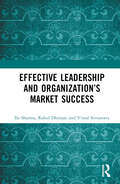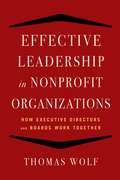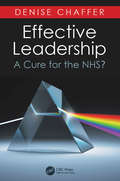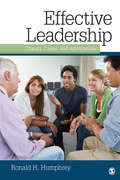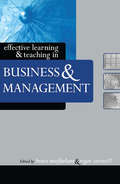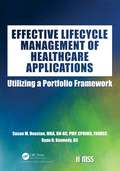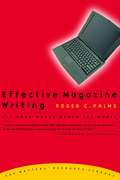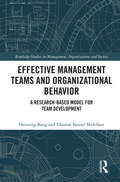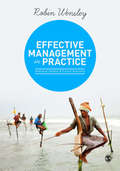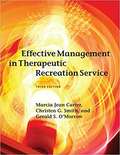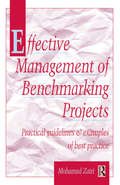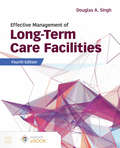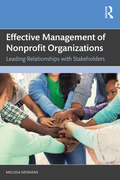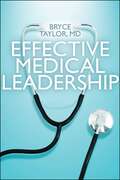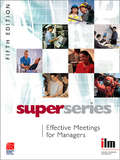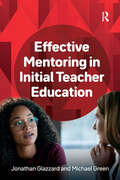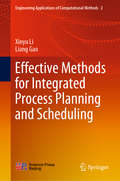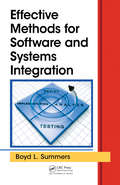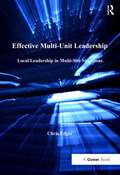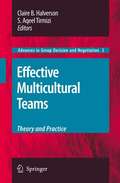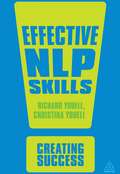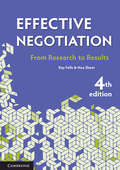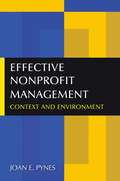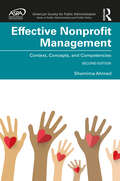- Table View
- List View
Effective Leadership and Organization’s Market Success
by Rahul Dhiman Ila Sharma Vimal SrivastavaEffective leadership and organizational performance are concepts that continue to receive widespread attention in the business world. This book explores the importance of strategic leadership and the value it adds to organizations. It focuses on strategies to achieve market success and organizational performance as well as the challenges of leading in a fluctuating market. The book looks at recent trends in leadership development and the different styles of leadership. It dispels existing myths about leadership and offers an understanding of principles which will allow leaders to be more adaptable and effective and steer businesses and organizations into a more stable future. This book will be of interest to researchers and students working in the field of business, organizational communication, business management, human resource management and business studies.
Effective Leadership for Nonprofit Organizations: How Executive Directors and Boards Work Together
by Thomas WolfManaging a nonprofit organization has many challenges. One key to success is building a strong relationship between the executive director and the board of trustees. This book is a treasure trove of information for navigating the personal, political, and legal minefields that cause so many nonprofits to fail. Dozens of case studies illuminate the key issues that often impede the progress of nonprofit organizations. Each chapter also contains a set of questions that enable leaders to reflect on the health of their own organization and also evaluate other nonprofits, as well as to create sustainable, effective business practices and productive working relationships. Topics discussed here include: Communication between managerial parties Sharing powers and responsibilities Fund-raising Financial oversight and boundaries Planning programs Hiring and firing Developing partnerships Assessing business practices * Building productive working relationships * And much moreWhether you are an executive director, a board member, or someone contemplating either important role, Effective Leadership in Nonprofit Organizations is an excellent resource for understanding the dynamics of nonprofits and creating a strong organization.
Effective Leadership: A Cure for the NHS?
by Denise ChafferWhile the investigations and reports which have followed recent health care scandals in the UK have highlighted the very important issue of addressing organizational culture and the need for more effective leadership at every level, patients and their families have struggled to comprehend how such things can occur in a health service that is suppos
Effective Leadership: Theory, Cases, and Applications
by Ronald H. HumphreyEffective Leadership: Theory, Cases, and Applications, by Ronald H. Humphrey, integrates traditional and new leadership theories—including transformational leadership, leader-member exchange, authentic leadership, servant leadership, self-leadership, shared and distributed leadership, identity theory, and the value of emotions and affect—to provide a comprehensive look at the many facets of effective leadership. Practical and fun to read, this innovative book incorporates personal reflections and current business examples to bring the theories of organizational leadership to life. In addition, “Put it in Practice” features help readers see how they can apply the leadership research to their own work lives, while leadership cases throughout demonstrate how real leaders have succeeded by applying the leadership principles discussed in the book.
Effective Learning and Teaching in Business and Management (Effective Learning and Teaching in Higher Education)
by Bruce Macfarlane Roger OttewillWritten to meet the needs of teachers, lecturers and tutors working at different levels and in many situations, this is the guide to surveying and understanding the key issues, best practices and new developments in business and management studies. Teaching in this field is a multi-faceted experience. The authors use an international perspective and support a wide range of situations by concentrating on five key areas: * the teaching and supporting of learning* the design and planning of learning activities* assessment and giving feedback to students* developing effective learning environments and student learning support systems* reflective practice and professional development. Practical and clear, this book will prove an invaluable guide for all those with an interest in developing business and management education and is essential reading for all those looking for professional accreditation for recognition of their teaching. It is also indispensable for the less experienced teacher seeking material for reflection and advice.
Effective Lifecycle Management of Healthcare Applications: Utilizing a Portfolio Framework (HIMSS Book Series)
by Susan M. Houston Ryan D. KennedyThe rapid growth of software applications within healthcare organizations has made it essential to have defined methodologies and formal processes for the management of the entire Information Technology (IT) portfolio. Utilizing a portfolio management framework throughout an application’s lifecycle will provide the necessary structure to ensure that all new applications are properly evaluated, and, once implemented, remain relevant while continuing to meet organizational requirements. While an organization may have a few large "organization-wide" systems such as the Electronic Health Record (EHR), lab or radiology systems, they also have a large quantity of other clinical, administrative, and research systems. Some larger organizations now have hundreds of software applications to support and manage. The IT staff must be able to implement new requests while still maintaining the current application portfolio. Utilizing a standard repeatable process will help to manage these large portfolios of software applications. This book reviews the management of applications throughout their lifecycle, from initial request through disposition. Best practices dictate that every newly requested application undergoes analysis followed by an approval decision from the organization’s governance committee. The initial implementation project must include activities to prepare for ongoing support while ensuring the application is compliant with all security, privacy, and architecture requirements. An application spends years in operations and maintenance where changes occur regularly through configuration and release management, or additional projects. The cycle continues until disposition. Understanding when to dispose of an application is just as important as deciding when to implement a new one. A defined process for disposing of an application ensures all parts are properly removed or destroyed.
Effective Magazine Writing: Let Your Words Reach the World
by Roger PalmsLet your words reach the WorldIf you are a writer who wants to have an impact with your words in the Christian magazine market, this book is for you. The former editor of Decision magazine, Palms helps you take stock of your gifts and use the to creatively minister to others. Giving a clear understanding of each step in the magazine process, Palm describes how to work with editors, write a query letter, and conduct interviews. He demonstrates how to find ideas, develop each draft, and overcome problems with grammar, tenses, story line, and voice. The book also addresses the ethical and legal side of writing, as well as understanding the diversity of readers in our every-changing culture.From the Trade Paperback edition.
Effective Management Teams and Organizational Behavior: A Research-Based Model for Team Development (Routledge Studies in Management, Organizations and Society)
by Henning Bang Thomas Nesset MidelfartMost contemporary organizations use management teams to manage and coordinate their businesses at all levels of the organizational hierarchy. Management teams typically set overall goals, strategies, and priorities, making vital organizational decisions. They discuss issues, solve problems, offer advice, and ensure various processes and units are aligned and interact efficiently. Although management teams are vital for overall organizational performance, research indicates that they are largely underused and less effective than their potential would suggest for value creation. This book provides a research-based and practical model of the characteristics of effective management teams. It looks in depth at each factor of the model, discusses the supporting research, provides examples of how the factors influence the work and effectiveness of management teams, and shares tips and tools for successfully working with management team development. It provides researchers, academics, and students of organizational behavior with an overview of the variables that empirical research has found to be robustly related to management team effectiveness and will enable leaders and management consultants to develop more effective management teams.
Effective Management in Practice: Analytical Insights and Critical Questions
by Robin WensleyIn this lively and entertaining book, Robin Wensley guides the reader through the basic analytical approaches to decision making required for more effective management practice.<P><P> Packed with diagrams, anecdotes and examples which bring the book to life, Effective Management in Practice: <P> - clearly presents a wide range of management tools, techniques and theoretical insights in just the right amount of depth for current and future managers<P> - illustrates the need for a balanced approach, emphasizing the importance of the questioning process in clarifying the nature of action proposals and any underlying assumptions<P> - eschews any approach which advocates one right way but at the same time encourages a greater appreciation of practical issues through analysis and theory<P> Students of management, academics and any practitioner interested in exploring a range of different approaches to management will enjoy and treasure this book.
Effective Management in Therapeutic Recreation Services Third Edition
by Marcia Jean Carter Christen G. Smith Gerald S. O'MorrowEffective Management in Therapeutic Recreation 3rd Edition,provides theoretical and practical knowledge about the management of therapeutic recreation services in health and human service organizations in North America. The text was written for upper-level under-graduate students as well as practitioners. The text was also prepared for a therapeutic recreation specialist who has responsibility for managing direct therapeutic recreation service and the assignment and direction of staff, volunteers, and interns who deliver the service.
Effective Management of Benchmarking Projects
by Mohamed ZairiEffective Management of Benchmarking Projects shows you how to apply benchmarking to a variety of projects. Effective Management of Benchmarking Projects equips the project team or manager with all the necessary competence for managing projects effectively. This practical book begins with definitions of 'what to benchmark' and ends with a stimulating real case study where a benchmarking project was conducted by observing all the necessary rules and with total adherence to the various protocols.This book deals with the application of benchmarking. It gives real examples of effective applications from such companies as: Rank Xerox, D2D, American Express, Rover, Texas Instruments.
Effective Management of Long-Term Care Facilities
by Douglas A. SinghEffective Management of Long-Term Care Facilities, Fourth Edition examines the complex operations of the long-term care facility and offers critical skills to current and future long-term care administrators for delivering quality, cost-effective services. An excellent resource for both new and seasoned long-term care managers, this logically organized text begins with an understanding of what long-term care is and why it's an integral part of the health care delivery system. It moves on to explore the legal and regulatory parameters and payment constraints within which long-term care facilities must be managed; each of the main functional departments that administrators must understand and oversee; and, effective governance and leadership and management of human resources, marketing and quality—much of which is unique to nursing home administration. The final section of the book offers case studies to simulate situations that the administrator is likely to encounter in practice.
Effective Management of Nonprofit Organizations: Leading Relationships with Stakeholders
by Melissa NewmanEffective Management of Nonprofit Organizations: Leading Relationshipswith Stakeholders provides practical information, rooted in organizationalbehavior theory, for the effective and successful management of nonprofitorganizations and key stakeholder groups. The book enables the readerto identify the ways in which application of management principles andtheory varies between nonprofit and for-profit organizations. It alsooffers a path to develop the skills necessary to lead a nonprofit, enactorganizational change, and create strategic plans, as well as recognizeand engage with revenue mechanisms. Using case studies and narrativeexamples, the book provides the basis for the key skills, includingmarketing, accounting, entrepreneurship, governance, fundraising, and ofcourse leadership and management. Structured around the key themes ofstaff, volunteers, donors, and community, topics include diversity, ethics,decision-making, culture, conflict, volunteer engagement, fundraising andstewardship, grants, foundations, PR, lobbying and government relations,and others.This book is ideal for college students undertaking a nonprofit managementcourse.
Effective Medical Leadership
by Bryce TaylorThe modern hospital represents a complex community in which life and death decisions are made on the front lines of patient care, and difficult operational and strategic initiatives are developed in the offices of institutional leaders. Effective Medical Leadership describes the unusual position of a medical leader in an organization often administered by non-medical managers.Through extensive and situational examples in the complex hospital setting, Dr. Bryce Taylor illuminates the principles of leadership, focusing on the challenges, the solutions, and the daily life of the head of a division, department, or program. In hospitals, just as in other large organizations, effective leaders must appreciate the big picture, pay attention to detail, and, above all, care about the careers of their constituents in addition to patient health. Here, Taylor outlines successes as well as failures, emphasizing that leadership, while an imperfect science, is based on common sense, integrity, an orientation to the welfare of colleagues, and a passionate and consistent commitment to the mission of an organization.
Effective Meetings for Managers (Institute of Learning & Management Super Series)
by Institute of Leadership & ManagementSuper series are a set of workbooks to accompany the flexible learning programme specifically designed and developed by the Institute of Leadership & Management (ILM) to support their Level 3 Certificate in First Line Management. The learning content is also closely aligned to the Level 3 S/NVQ in Management. The series consists of 35 workbooks. Each book will map on to a course unit (35 books/units).
Effective Mentoring in Initial Teacher Education
by Jonathan Glazzard Michael GreenAn evidence-informed guide to effective mentoring in initial teacher education.Reflecting the 2024 ITE Criteria and latest inspection framework, it is perfect for HE lecturers in education and Initial Teacher Education (ITE) mentors within schools. Accessibly written, it covers the most recent developments in ITE policy and the evolving roles and responsibilities of the school-based mentor.From 2024, mentors are required to undertake significantly more training than previously, and ITE partnerships are required to develop the role of lead mentor. This timely book supports ITE partnerships and individual mentors in navigating these changes. It prepares readers by outlining the relevant developments in ITE policy, specifically looking at the implications for the roles and responsibilities of mentors.This book emphasises the shift for ITE mentors from the role of 'assessor' to teacher development. Each chapter is enriched with evidence-informed research and critical questions. Topics include: the ITE curriculum, inclusive, phase- and subject-specific mentoring, trainee progress, the principles and models of generic mentoring, and mentoring early career teachers. There is also a chapter dedicated to supporting trainee's workload and mental health including DfE guidance on reducing workload for trainees, reducing cognitive load, and pastoral care in ITE.
Effective Methods for Integrated Process Planning and Scheduling (Engineering Applications of Computational Methods #2)
by Liang Gao Xinyu LiThis book summarizes a series of research work on integrated process planning and scheduling (IPPS) done by the authors, focusing on discussing the properties, novel solution methods and applications of process planning, scheduling and IPPS problems under different machining environments. It is a valuable reference resource for teachers, students and researchers working in the fields of engineering, management science and other related disciplines.
Effective Methods for Software and Systems Integration
by Boyd L. SummersBefore software engineering builds and installations can be implemented into software and/or systems integrations in military and aerospace programs, a comprehensive understanding of the software development life cycle is required. Covering all the development life cycle disciplines, Effective Methods for Software and Systems Integration explains h
Effective Multi-Unit Leadership: Local Leadership in Multi-Site Situations
by Chris EdgerThere is a growing recognition of the increasing importance of ’local leadership’ practice within multi-unit service contexts, given the threat to costly land-based retail infrastructures from smart technologies. Multi-site organizations are economically significant, but currently under-researched and poorly understood. In Effective Multi-Unit Leadership, Chris Edger looks at that key managerial cohort in the retail, hospitality and service sectors operating between the centre and unit - the Multi-Unit Leader (MUL). This district, area or regional manager, is tasked with maximising revenue and profit from a complex and ambiguous positional space, being sandwiched between the centre and unit, facing the MUL paradox: how do they motivate unit managers and team members to provide great service whilst simultaneously fulfilling the Centre's compliance agenda? Based on extensive case study research across a range of multi-unit service organisations, Edger advances an Integrated Model of MUL that elucidates how key activities (sales-led service, systems and standards - 3Ss) are driven through behavioural practices (commitment, control and change - 3Cs) underpinned by MUL personal characteristics (expertise, emotional intelligence and energy - 3Es). Central to this model is the notion of ’portfolio optimisation through social exchange’ (POSE) where MULs apply ’local leadership’, leveraging their portfolios through the deft application of exchange-based currencies. Replete with case studies, Effective Multi-Unit Leadership will appeal to high potential unit managers; existing multi-unit leaders who want to improve their performance levels; and retail/service directors wishing to train and coach their direct reports; as well as business educators and those with an academic interest in organisational studies.
Effective Multicultural Teams: Theory and Practice
by Claire B. Halverson S. Aqeel TirmiziMulticultural and multinational teams have become an important strategic and structural element of organizational work in our globalized world today. These teams are demonstrating their importance from the factory floors to the boardrooms of contemporary organizations. The emergence of multicultural teams is evident across a variety of organizations in the private, public, and civil society sectors. These developments have led to an increasing interest in the theory and practice of multicultural teams. Management educational and training programs are giving increasing attention to these developments. At the same time, there is emerging interest in research about and study of multicultural teams. This book emerged from our teaching, research, and consulting with multicultural and diverse teams in multiple sectors over the last several years. In particular, we have developed and refined our ideas about the concepts in this book from teaching an advanced course called Effective Multicultural Teams in the Graduate Program at the School for International Training (SIT) in Vermont. We have learned from the rich background of students who are from, and have worked in, six contents, and who are, or plan to be, working in the public, educational, not-for-profit, and for-profit sectors. Additionally, we have engaged with a variety of teams through our consulting and training, providing consultation to teams in a variety of sectors and continents as they struggled to become more effective.
Effective NLP Skills
by Richard Youell Christina YouellNeuro Linguistic Programming (NLP) is one of the most powerful communication tools available. It helps you understand what makes people tick, helps you to influence and persuade people and gives you an insight into what really happens when we communicate. Effective NLP Skills, 2nd edition, covers all the NLP models, tools, skills and behaviours you need, and teaches you how to channel this knowledge into improving your performance at work. You will discover how to manage yourself and others, how to use language to get what you want, outcome thinking, how to build rapport and how to motivate others. With crucial insight into the workings of the brain and essential techniques to enhance your learning, Effective NLP Skills is for anyone who wants to utilise the NLP model to get ahead in their career.
Effective Negotiation
by Ray FellsEssential reading for students and professionals in the fields of business, law and management, Effective Negotiation offers a realistic and practical understanding of negotiation and the skills required in order to reach an agreement. In this book Ray Fells draws on his extensive experience as a teacher and researcher to examine key issues such as trust, power and information exchange, ethics and strategy. Recognising the complexity of the negotiation process, he gives advice on how to improve as a negotiator by turning the research on negotiation into practical recommendations. It covers: - How to negotiate strategically - Negotiating on behalf of others - Cultural differences in negotiation The principles and skills outlined here focus on the business context but also apply to interpersonal and sales-based negotiations, and when resolving legal, environmental and social issues. Effective Negotiation also features a companion Website with lecturer resources.
Effective Negotiation: From Research to Results
by Ray Fells Noa SheerThe fourth edition of Effective Negotiation provides a practical and thematic approach to negotiation and mediation in professional contexts. Drawing on research and extensive teaching and practical experience, Fells and Sheer describe key elements of negotiations and explain the core tasks involved in reaching an agreement: information exchange, solution-seeking and concession management. This edition features a substantial revision and re-alignment of content, providing discussion of overarching themes and methodologies before moving to focused considerations of the underlying mechanics of negotiation. A new chapter on deadlocks provides detailed analysis of strategically managing and resolving deadlocked negotiations. In addition to the 'Negotiation in Practice' and 'Negotiation Skill Tips' boxes, chapters now include real-world case studies. An accessible, practical and strategic exploration of the complex mechanics and dynamics of negotiation, mediation and dispute resolution, Effective Negotiation remains an essential resource for students and professionals in business and management, law and human resource management.
Effective Nonprofit Management: Context and Environment
by Joan E. PynesEmployees with valuable skills and a sense of their own worth can make their jobs, pay, perks, and career opportunities different from those of their coworkers in subtle and not-so-subtle ways. This book shows how such individual arrangements can be made fair and acceptable to coworkers, and beneficial to both the employee and the employer.
Effective Nonprofit Management: Context, Concepts, and Competencies (ASPA Series in Public Administration and Public Policy)
by Shamima AhmedUnderlining the relationship between the public and nonprofit sectors, Effective Nonprofit Management: Context, Concepts, and Competencies, 2nd Edition comprehensively explores of the practical art of forming, managing, and leading nonprofit organizations, contextualizing the changing socio-political conditions and expectations of key stakeholders in nonprofit organizations. Grounded in the practical experiences of real-life nonprofit managers, this thoroughly revised second edition explores contemporary issues that are becoming central to effective nonprofit management, including: an increasing emphasis on outcome assessment and accountability; innovative use of social media; big foundations’ impacts on nonprofits and public policy making; tensions between federal, state, and local governments with nonprofits; and the importance of instilling a culture of ethics in the sector. A completely new chapter on nonprofit ethics and accountability has been added. Each chapter introduces the reader to relevant and current scholarship on the topic, utilizes the language of nonprofit practice, explores contemporary issues and examples, provides practical tips, includes text boxes with profiles of nonprofit organizations and best practices, and ends with a short and practical case study followed by discussion questions. Effective Nonprofit Management, Second Edition will be of interest to practitioners as well as graduate and upper division undergraduate students enrolled in nonprofit and public management courses.
